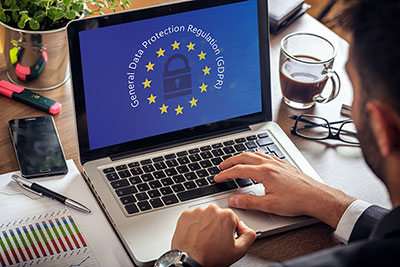Businesses are harnessing the power of AI to drive innovation and efficiency. However, with great power comes great responsibility. The General Data Protection Regulation (GDPR), enacted by the European Union, plays a pivotal role in governing how AI systems handle personal data. As we navigate through 2025, it’s imperative for businesses to understand the intricate relationship between GDPR and AI to ensure compliance and avoid substantial penalties.
Understanding GDPR's Impact on AI
The GDPR, effective since May 2018, is designed to protect the personal data of EU citizens. Its principles directly influence AI adoption, especially in areas involving data processing and automated decision-making. Key aspects include:
Data Protection by Design and Default: Businesses must integrate data protection measures into AI systems from the outset, ensuring that only necessary data is processed for specific purposes.
Lawfulness, Fairness and Transparency: AI systems must process personal data based on legitimate grounds and businesses are required to inform individuals about how their data is used in AI applications.
Purpose Limitation and Data Minimisation: Personal data should be collected for explicit, legitimate purposes and not processed beyond those intentions. AI models should utilise the minimal amount of data necessary to achieve their objectives.
Rights of Data Subjects: Individuals have rights to access, rectify, erase, and restrict the processing of their data. AI systems must be designed to accommodate these rights effectively.

Real-World Consequences of Non-Compliance
The repercussions of failing to align AI practices with GDPR requirements can be severe. Several high-profile cases illustrate the financial and reputational damage businesses can incur. The audacity of some of these companies, as well as the timeframe, suggests that the global business culture in itself is wastly different from the European privacy-first and simply put, some just don’t care about European citizens’ privacy or rights.
TikTok: Failing to Protect Children’s Data. In September 2024, TikTok was fined €345 million by the Irish Data Protection Commission (DPC) for failing to adequately protect children’s data. The investigation found that TikTok’s default settings made children’s accounts public by default and that the platform did not have sufficient age verification measures in place. This resulted in minors’ data being processed improperly, putting them at risk of privacy breaches. European Data Protection Board
DeepSeek: Under Investigation for AI Data Practices. In January 2025, France’s Commission Nationale de l’Informatique et des Libertés (CNIL) opened an investigation into the Chinese AI start-up DeepSeek. The company’s DeepSeek-V3 model was suspected of processing personal data without proper consent and without full transparency regarding how training data was collected. Reuters
Meta’s AI Data Collection: GDPR Compliance vs Global Privacy Loopholes. In September 2024, Meta (formerly Facebook) was found scraping public posts from users across Facebook and Instagram to train its AI models. European users were given the right to opt out, but in countries without GDPR protections, such as Australia, users had no such option. The Guardian
Navigating Compliance Challenges
Ensuring that AI systems comply with GDPR is a multifaceted endeavour. Businesses should consider the following strategies:
Conduct Data Protection Impact Assessments (DPIAs): Before deploying AI systems that process personal data, perform DPIAs to identify and mitigate potential privacy risks.
Implement Robust Data Governance Frameworks: Establish clear policies for data collection, storage, and processing, ensuring that AI models adhere to GDPR principles.
Enhance Transparency Measures: Clearly communicate to individuals how their data is used in AI systems, providing accessible information about processing activities.
Ensure Data Subject Rights: Develop mechanisms that allow individuals to exercise their rights easily, such as accessing or deleting their data from AI systems.
Stay Informed on Regulatory Updates: The regulatory environment is dynamic. For instance, the EU’s AI Act, effective from August 2024, introduces additional compliance requirements for AI systems, categorising them based on risk levels. Digital Strategy
The Role of Regulatory Bodies

European data protection authorities are actively monitoring AI applications to enforce GDPR compliance:
CNIL (France): In February 2025, CNIL released recommendations to guide organisations in the responsible development and deployment of AI systems, emphasising the importance of data protection. CNIL
Garante (Italy): Beyond the OpenAI fine, Garante has been proactive in investigating AI applications, ensuring they align with GDPR mandates.
Balancing Innovation with Compliance
While GDPR sets stringent standards, it doesn’t stifle innovation. Instead, it encourages businesses to adopt ethical AI practices that respect user privacy. By embedding data protection into AI development, companies can build trust and foster sustainable growth.
As AI continues to revolutionise industries, understanding and adhering to GDPR requirements is paramount. Non-compliance can lead to hefty fines and damage to reputation. By proactively implementing robust data protection measures, businesses can navigate the complex intersection of AI and GDPR, ensuring both innovation and compliance.
Do you believe most businesses fully grasp the impact of GDPR on AI applications?
North Atlantic
Victor A. Lausas




